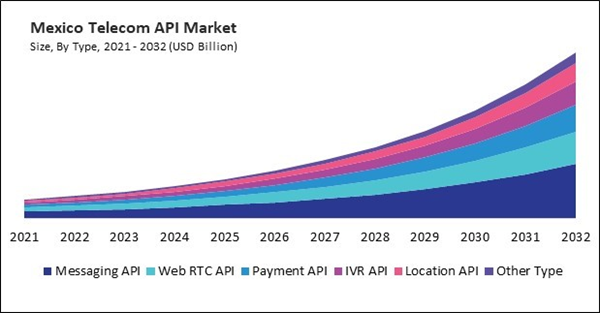The US market dominated the North America Telecom API Market by country in 2024, and is expected to continue to be a dominant market till 2032; thereby, achieving a market value of $284.92 billion by 2032. The Canada market is experiencing a CAGR of 24.3% during 2025-2032. Additionally, the Mexico market is expected to exhibit a CAGR of 23% during 2025-2032.
The Telecom API market has emerged as a pivotal force in the telecommunications industry, transforming how communication services are integrated, delivered, and monetized in an increasingly digital world. Telecom APIs serve as the critical bridge between telecommunications infrastructure and third-party applications, enabling seamless connectivity, data exchange, and service innovation across diverse ecosystems. These interfaces allow developers, businesses, and service providers to leverage telecom capabilities - such as voice, messaging, location services, and billing - without needing to build complex infrastructure from scratch.
By abstracting the underlying complexity of telecom networks, APIs empower organizations to create tailored solutions, enhance customer experiences, and unlock new revenue streams. As the demand for real-time, scalable, and flexible communication solutions grows, the Telecom API market is witnessing rapid expansion, driven by the convergence of telecommunications with digital platforms, cloud computing, and emerging technologies.
North America holds a prominent position in the global Automotive Energy Recovery Systems (AERS) market, driven by the region's advanced automotive industry, stringent environmental regulations, and ongoing investments in green mobility technologies. Countries like the United States and Canada are at the forefront of adopting energy-efficient vehicle components that reduce fuel consumption and CO₂ emissions. The North American AERS market includes a broad spectrum of systems such as regenerative braking, exhaust heat recovery, and thermoelectric generation - each playing a vital role in enhancing vehicle energy efficiency. With a high concentration of both established automobile manufacturers and emerging electric vehicle (EV) startups, the region demonstrates strong momentum toward next-generation vehicle technologies, where energy recovery systems are integral.
A major trend shaping the North American AERS market is the increasing shift toward electric and hybrid vehicles. Regenerative braking systems are now standard in most EVs and hybrid electric vehicles (HEVs), with automakers like Tesla, Ford, and GM actively refining these technologies to improve efficiency and extend driving range. The competitive landscape in North America is dominated by a mix of traditional OEMs, such as Ford, General Motors, and Stellantis, alongside new entrants like Rivian and Lucid Motors. These companies are increasingly collaborating with Tier 1 suppliers including Bosch, Continental, BorgWarner, and Denso, who are major innovators in AERS components.
The region has witnessed a surge in patent filings and technical partnerships as companies race to develop more compact, efficient, and cost-effective energy recovery systems. Competitive differentiation is emerging around system integration, software intelligence, and modularity, enabling flexible application across vehicle platforms. Lastly, high fuel prices and public consciousness around sustainability have made energy-efficient driving more desirable, directly supporting the expansion of the AERS market across both passenger and commercial vehicle segments.
List of Key Companies Profiled
- Adobe, Inc.
- Avaya, Inc. (Avaya Holdings Corp.)
- Deutsche Telekom AG
- IBM Corporation
- Microsoft Corporation
- Amazon Web Services, Inc. (Amazon.com, Inc.)
- AT&T, Inc.
- Verizon Communications, Inc.
- Ericsson AB
- Twilio, Inc.
Market Report Segmentation
By End User
- Partner Developers
- Enterprise Developers
- Internal Telecom Developers
- Long Tail Developers
By Type
- Messaging API
- Web RTC API
- Payment API
- IVR API
- Location API
- Other Type
By Country
- US
- Canada
- Mexico
- Rest of North America
Table of Contents
Companies Mentioned
- Adobe, Inc.
- Avaya, Inc. (Avaya Holdings Corp.)
- Deutsche Telekom AG
- IBM Corporation
- Microsoft Corporation
- Amazon Web Services, Inc. (Amazon.com, Inc.)
- AT&T, Inc.
- Verizon Communications, Inc.
- Ericsson AB
- Twilio, Inc.









